Is Restraining Order Public Record in All States?
Restraining orders are public records in most states. However, some, if not most, information in relation to the order will remain confidential.
 Written by Background Check Repair
Written by Background Check Repair
Criminal Records | April 29, 2024
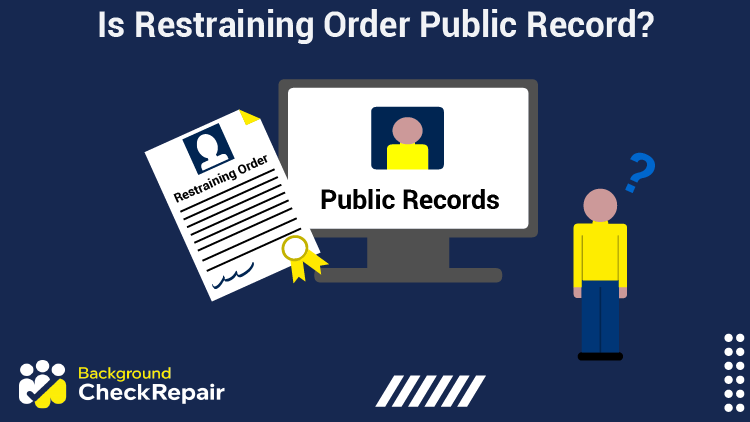
Table of Contents
Individuals facing (or who are issued) a restraining order often wonder, is a restraining order public record or a criminal record?
Since the laws vary from state to state, and there are a number of circumstances and factors that impact what records are part of a person’s criminal history, it can be tricky to have a blanket, one-size-fits-all answer to this question.
Indeed, regarding the official record, state statutes determine where a restraining order will end up.
To determine exactly is a restraining order public record, there are some legal questions to answer first. This guide explains them.
The main thing that individuals should look at is what court the order was filed in, as this will give individuals a pretty good idea of whether or not this information will appear on their record and be present on a background check.
However, besides the court where the order was filed there is still a lot to consider.
When it comes to the question of, is restraining order a public record, this will not actually get individuals any closer to figuring out where the order will be available. This is because the laws surrounding restraining orders, and other court records, are a little bit confusing. The Freedom of Information Act (FOIA) is the main law that will be involved here.4
Basically, the FOIA is intended to increase transparency between government agencies and the general public. This extends to the courts and effectively requires that all court documents be available to the public.
However, there are plenty of exceptions to the FOIA, the most notable example would be government documents that are a matter of national security and those that create a privacy threat to an individual or those involving children.
Court documents will be made public automatically, regardless of the case. However, there are plenty of court cases that deal with information and issues that are of no consequence to the public, particularly cases that are heard in civil and family courts.
Although criminal cases are always of interest to the public since the results of these cases will have a direct impact on the safety of the community, the same can not always be said for civil cases.
Many of these cases deal with family issues and might even involve children. Not only is this information not in the public interest, but the information being public could potentially harm the individuals involved and leave them susceptible to harassment.
Due to the potentially harmful effects of this information being public, and the fact that the public has very little to gain from it being public, many judges will seal this information upon completion of the case. When a court case is sealed it is no longer available to the public.
Instead, only official agencies, individuals with court orders, and the individuals themselves are able to access the records. This is where restraining orders come in.
Restraining orders are most often filed in civil or family courts. This means that the majority of restraining order cases are sealed upon completion, making them inaccessible to the public and thus the information about the order will not appear on the individual’s record.7
Although the answer to, is a restraining order public record, is technically yes, it won’t necessarily be accessible unless it is connected to a criminal act.
Restraining orders filed in criminal court will be part of the public record and can easily be accessed by anyone willing to request the court records for the case.
Criminal records can be sealed, but it is exceedingly rare and requires special and specific circumstances in most cases. In most cases, sealing juvenile records is a little bit easier than sealing or expunging adult criminal records.
The issue of is a restraining order or a criminal record will depend on the circumstances surrounding the order. Most orders are a result of the individual who feels unsafe requesting a restraining order from a judge, this individual is known as the petitioner.
When an individual petition for a restraining order, the case will be filed and heard in civil court.
Should the order be granted, this information will not appear on a criminal record since no criminal charges were filed. However, in some cases, a restraining order will be filed in criminal court.
In some criminal cases, mainly those involving crimes like domestic violence or stalking, a judge may file a restraining order against an individual without a petitioner being involved at all.5
This is not always done but since most cases of domestic violence involve one individual being in danger a judge may essentially take it upon themselves to keep one individual away from the other for reasons of safety.
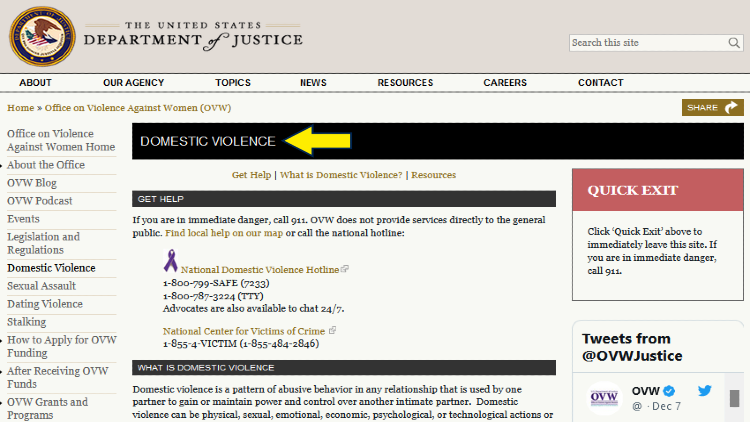
Domestic violence restraining orders are often sealed from public view.
When this happens, since all of the documents related to the criminal charges are considered public, the information regarding the restraining order will also be included in these public documents. This will result in both the criminal charges and the subsequent restraining order being present on the individual’s criminal record.
Many individuals will be concerned about, does a temporary restraining order go on your record, especially after hearing that things like dismissed or dropped charges can appear on a criminal background check. However, the main issue regarding restraining order records, that they are commonly filed in civil court which means they will likely be sealed, applies to temporary orders as well.
Although temporary restraining orders can sometimes be filed in a criminal court, all restraining orders that are filed in civil court will start out as temporary restraining orders. Basically, when an individual feels that they are in danger and files for a restraining order at the courthouse, there will usually be a hearing in front of a judge the same day.
Only the petitioner will need to be present during this hearing where they will have the opportunity to plead their case before a judge as to why they are in danger and why they need a restraining order. If the judge believes the individual is in danger they will be able to grant a temporary restraining order.6
The temporary restraining order is intended to keep the potentially dangerous individual away from the petitioner during the period of time between the initial filing and the final restraining order hearing which will involve testimony from both parties, rather than just the petitioner.
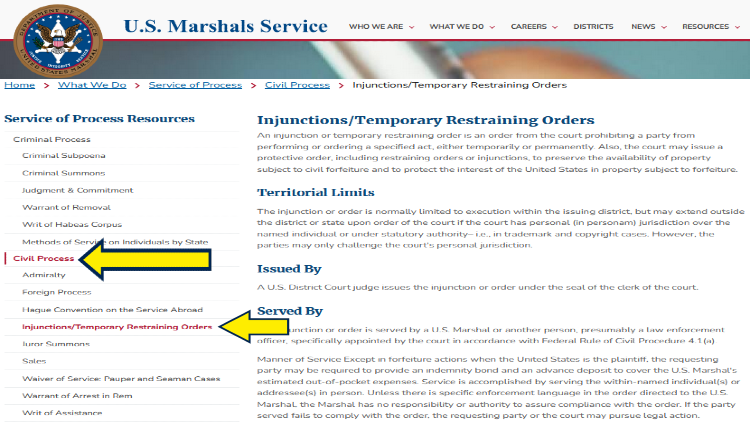
If an order of protection or a restraining order extends beyond a territory or state, then the jurisdiction falls within the range of the U.S. Marshals Service.
Should the petitioner prove that the defendant poses a risk to their safety, then the temporary restraining order will become a final or permanent restraining order. The exact parameters of the final restraining order will vary by state.
However, if the final order is not granted then the TRO will be lifted. Regardless of whether it is lifted or becomes a permanent order, the TRO should not appear on the individual’s record as long as it was filed in civil court.
When it comes to, is a temporary restraining order public record, the same conditions as a permanent restraining order will apply. A TRO is usually a result of a civil court restraining order filing and thus will not appear on the public record as the records will likely be sealed due to containing personal information that is not in the public interest.
There is a lot of confusion regarding the public records law in each state and at the federal level, leading to frustration when individuals can not find certain records.
Part of this confusion is due to the fact that there is more than one public records law since most states have their own state-level public record laws in addition to those required by the federal freedom of information act.
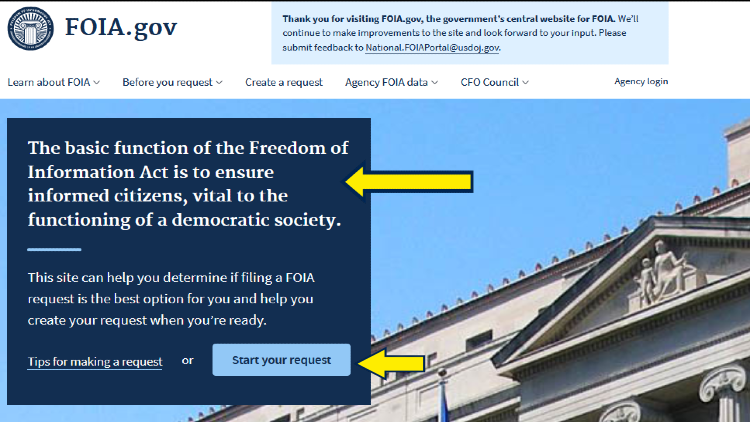
The Freedom of Information Act was designed to make it possible to see what the federal government is doing, but it also extends to private individuals.
Individuals should research their state’s open records laws to avoid making records request that will not be granted. Although the FOIA and most state open records laws allow access to all government records, there are plenty of exceptions.
The Freedom of information act alone lists 9 exceptions that prevent certain information from being accessed by the public.3 The main thing to remember is that FOIA is centered around keeping the public informed on matters of public interest.
Generally, family and civil court records do not meet the requirements to be considered public interest since the results of the case will not have any impact on the general community. Although this can be frustrating for curious individuals, it is necessary to protect those involved in the case.
A restraining order background check is a great way for individuals to know for certain if a previous restraining order is currently on their record.
Aside from restraining order information, knowing how to obtain a background check on yourself for employment is also a great way to prepare and know what appears a background check for employment so that individuals are aware of all the information that an employer will see and allow individuals to determine and learn how to correct errors on your background check should there be mistakes in the report.
Performing a background check on yourself is extremely easy and can be done in several different ways.
The easiest method for most individuals will be to enter their name into the search bar at the top of this page to perform a public records search that will uncover any restraining order information that is currently on the individual’s record.
Other private background check agencies can also be used to perform the check. Although most of them require individuals to purchase a month-long subscription to perform the check, there are several that offer low-cost trials or a 7-day free trial background check so individuals can perform a single check at a low cost or for free.
Finally, those who are interested in the most intensive and thorough check possible can look into having a federal background check performed on themselves. Federal background checks are fingerprint-based checks that are performed by the FBI as part of their Identity History Summary Check.2
Although some jobs will require individuals to undergo an FBI background check, anyone is able to request one for themselves for a fee.
Many individuals will be interested in, can you look up restraining orders online, and will be surprised to find that you can in certain cases. As mentioned, not all restraining orders will be available at all, but individuals looking for orders that were not sealed or those filed in criminal court might be able to check for these records from their computers.
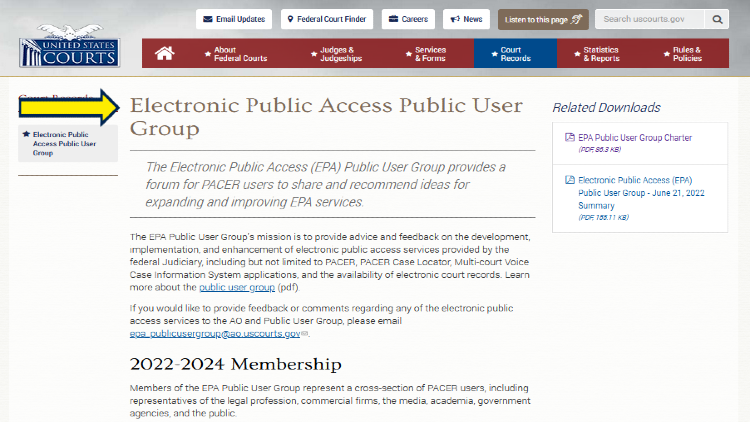
Public users may access the portal used by U.S. courts which also provides answers to membership questions and other features.
Individuals will first need to know the court where the restraining order was filed. All court records are only held by the court where the records were filed. Restraining orders will be filed at a local civil or criminal court.
Keep in mind that local federal courts will only have information on federal cases.1
Once the exact courthouse has been identified, individuals should check to see if they have a website where individuals can perform records requests. Since most records are digitized these days, many courts have developed online record-keeping systems that allow individuals to search and request records from their computers.
Assuming the courthouse has an online records request system, individuals can usually request records by using the name of the individual named on the records. However, having as much information as possible, ideally, the case number, will help the search go a little smoother.
If the records are found, individuals can usually request a certified copy of the record for a small fee. Keep in mind that if the record is sealed and the requester is not the individual named on the record, then it will require a court order to obtain the record.
Although it is fairly unlikely that a restraining order will appear on an individual’s record at all when it does it can have fairly serious consequences. Many people in this situation will want to know how to get a restraining order off your record, unfortunately, this is not easily done.
If the restraining order is on the individual’s record at all, this means it was likely the result of a criminal charge being filed against the individual. If the charges resulted in a conviction, the process to get the order removed from the record will be extremely difficult.
Sealing or expunging criminal records is a difficult process that will depend heavily on state laws regarding record sealing.
Most states have strict laws as to what records can be sealed and what records will remain on the individual’s record forever. Those hoping to get a record sealed should contact a lawyer who will have a better understanding of local laws and the sealing process.
Besides sealing the records, individuals who live in a state that limits how far back a background check can look for criminal history information can simply wait the full 7 years until their record cleared naturally. However, individuals should know these laws do not apply to official background checks, such as those performed by the FBI.
Individuals interested in how to check restraining order status will likely need to locate the original court documents from the restraining order hearing. These documents will outline the restraining order guidelines such as what kind of contact is allowed, if any, as well as how long the order will last.
Those who have yet to have the final restraining order hearing will likely have a TRO filed, the details of which will be served by an officer of the court directly to the individual.
If any of these documents have been replaced, individuals can request them from the court where they were filed. Even if the records were sealed, the individuals named on the record will still be able to access them.
Many people will be wondering how to get court records online for free, unfortunately, this is generally not possible. All records requests will usually involve a small copy fee to obtain a copy of the records.
There are some cases in which the fee will be waived but this is fairly rare and can only happen if the documents are of extreme public interest.
There are many different types of restraining orders. Many of these are fairly similar to each other and are used to distinguish the reason for the order or which court the order was filed in.
However, the vast majority of these orders are effectively the same: a document that requires one individual to stay away from another individual.
A civil harassment restraining order is a type of restraining order used in certain states that is aimed specifically at individuals who are victims of harassment, but not necessarily domestic abuse.
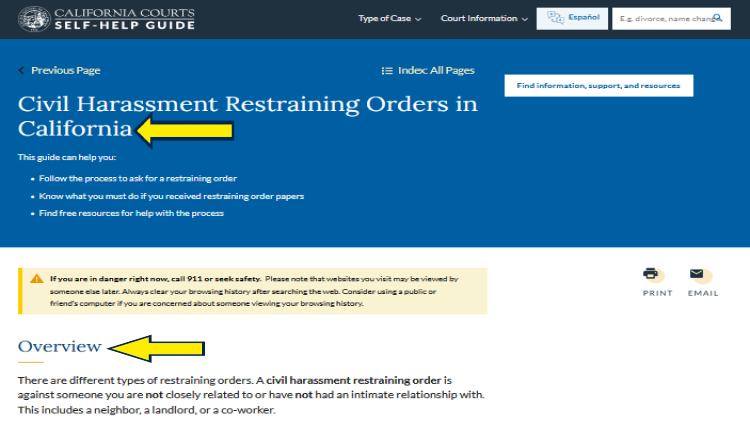
New laws and definitions, such as civil harassment claims, can be made in a number of states that have issued statues defining them.
These types of orders are not always given in domestic cases and can instead be used for cases involving stalking and similar crimes.
There are tons of terms for restraining orders such as stay-away orders, no-contact orders, protection orders, and more. However, the important thing to remember is that they all refer to the same thing and can generally be used interchangeably.
Even in states that have legal distinctions between these terms, they are still often used interchangeably since the exact difference between them is so minor.
Those asking, can you file a restraining order online, will be pleased to know that many states allow for individuals to complete all the necessary forms without having to go to a courthouse. Individuals should look for these forms on the website of their local civil court, or through their local police department.
Generally, the information that is requested is fairly basic, as the most important part of filing a restraining order is the hearing in front of a judge where the TRO will be granted.
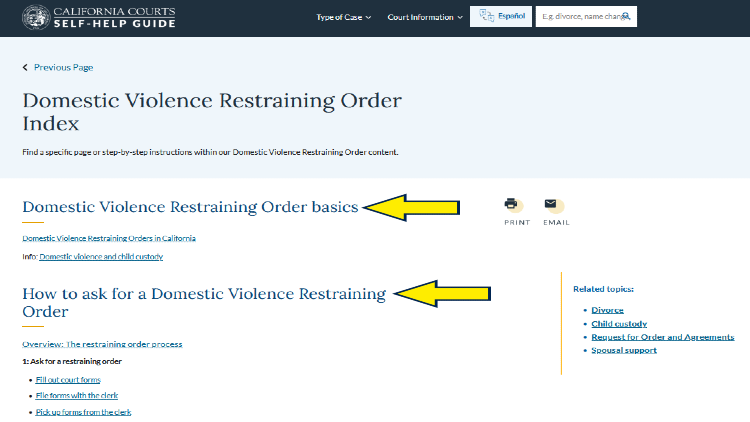
Many states allow users to file for restraining orders online.
Individuals will still be required to go to the courthouse in person to attend the hearing for the TRO.
When it comes to how to get a restraining order for harassment, the process is the same as almost any other restraining order. Individuals will need to go to the courthouse, or the website of their local civil court, and fill in the necessary forms to petition for a restraining order.
Even if the reason for the restraining order is something that would carry criminal charges, such as domestic violence, going through the civil court will be the fastest method to get a restraining order.
The most important thing to consider when asking is restraining order public record, is where the order was filed. It is extremely rare for an order filed in civil court to be public record and it is extremely rare for one filed in criminal court to be sealed.
Individuals should always do as much research as possible on local laws when facing a restraining order. Protective orders can affect someone’s life for a long time and individuals should be able to answer questions like, is restraining order public record, in order to better prepare for what’s ahead.
Restraining orders are public records in most states. However, some, if not most, information in relation to the order will remain confidential.
Restraining order records will be available to the public if they were filed in criminal court.
Only restraining orders filed in criminal court will be public knowledge, those filed in civil court will be sealed in most cases.
For individuals wondering, does a restraining order go on their record, the answer is a restraining order will only go on an individual’s record if the order was filed in criminal court, in which case it will appear on an individual’s criminal record.
Restraining orders are only public record in California when they come as a result of a criminal case.
California court records are generally free to search but require a fee to obtain copies.
All court records are technically public records but restraining orders filed in civil court will be sealed in most cases.
A domestic violence restraining order will likely be filed in criminal court and is thus likely to appear on a background check.
1Administrative Office of the U.S. Courts. (2023). Federal Court Finder. United States Courts. Retrieved January 2, 2023, from <https://www.uscourts.gov/>
2Federal Bureau of Investigation. (2023). Identity History Summary Checks (Rap Sheets). FBI.gov. Retrieved January 2, 2023, from <https://www.fbi.gov/how-we-can-help-you/more-fbi-services-and-information/identity-history-summary-checks>
3Office of Information Policy (OIP) U.S. Department of Justice. (2023). What Is the FOIA? Freedom of Information Act. Retrieved January 2, 2023, from <https://www.foia.gov/faq.html>
4US Department of Justice. (2022). The basic function of the Freedom of Information Act is to ensure informed citizens, vital to the functioning of a democratic society. Freedom of Information Act.gov. Retrieved January 2, 2023, from <https://www.foia.gov/>
5US Department of Justice. (2023). Domestic Violence. US Department of Justice. Retrieved January 2, 2023, from <https://www.justice.gov/ovw/domestic-violence>
6U.S. Federal Government, U.S. Department of Justice. (2023). Injunctions/Temporary Restraining Orders. US Marshals Service. Retrieved January 2, 2023, from <https://www.usmarshals.gov/what-we-do/service-of-process/civil-process/injunctions-temporary-restraining-orders>
7Wex Definition Team. (2021, July). Sealing of records. Legal Information Institute. Retrieved January 2, 2023, from <https://www.law.cornell.edu/wex/sealing_of_records>
We use cookies to ensure that we give you the best experience on our website. If you continue to use this site we will assume that you are happy with it